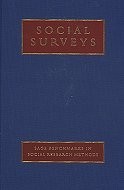|
Social Surveys: SAGE Benchmarks in Social Research Methods
|
|
Edited by David de Vaus
|

|

From the Editor's Introduction
The Nature of Social Surveys
Social surveys have been a tool of social investigation since the early days of empirical social science. However, there is little consensus as to what constitutes a social survey. Often the definition of a survey is implicit rather than explicit and can only be gleaned from the types of topics and strategies discussed under the heading of surveys.
Broadly, however, there are two approaches to defining survey research. A narrow approach views surveys as synonymous with quantitative data collected from a probability sample by means of a questionnaire or structured interview. The broader approach, which informs the selection of papers in these four volumes, regards surveys as representing a design for research that is based on a particular logic of data collection and analysis for drawing conclusions about the social world.
This approach does not restrict surveys to studies based on samples of people or to data collected using structured questionnaires. While many surveys may be based on samples (the sample survey), use a structured questionnaire and obtain information from and about people, these characteristics are not the defining characteristics of surveys.
Using this broader approach, the social survey can be contrasted with other empirical ways of learning about the social world - methods such as the social experiment or case studies. Social experiments employ the logic of interventions, randomization, outcomes and control groups while case studies rely on the intensive study of individual cases to draw conclusions about social reality and social processes. Social surveys provide an alternative way of learning about and drawing conclusions about social reality.
|
|
